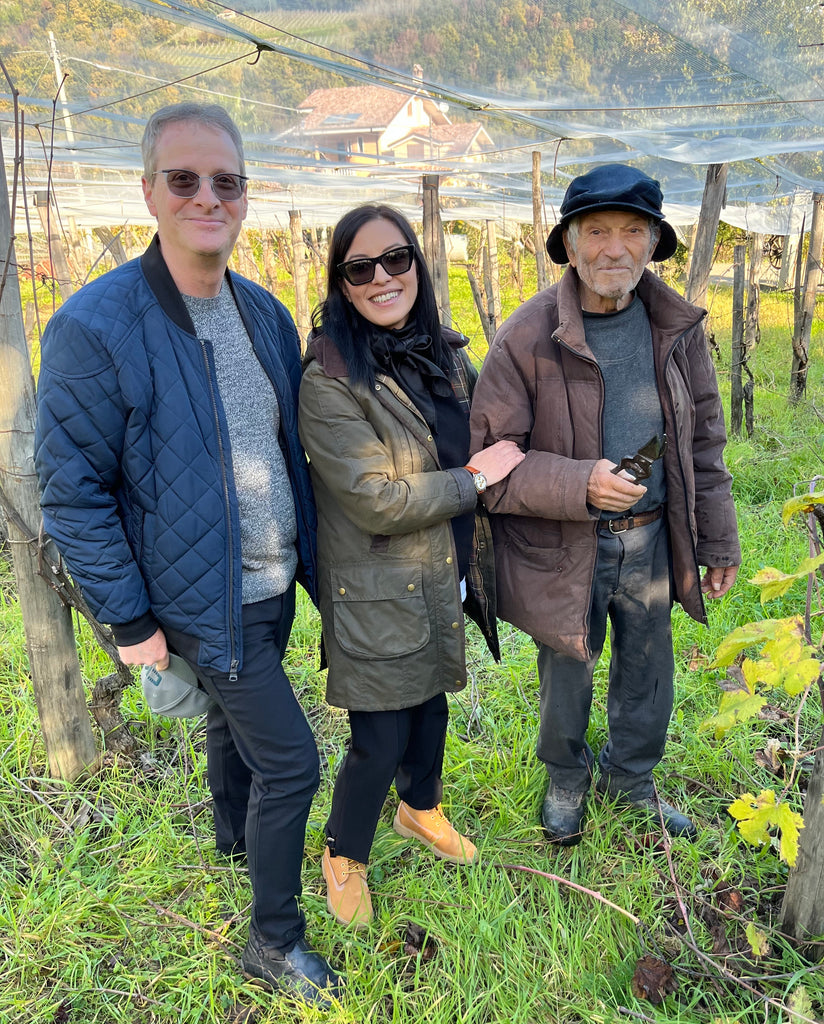Our tasting impressions
The aromatic elegance of Difesa is hard to describe. The various grapes intermingle seamlessly to produce a wine of precision, sophistication and depth. Dark red fruit flavors are beautifully framed by refined earthy tones. It dances lightly across the palate while enveloping it in a melange of gorgeous fruit, spice and zest. The tannins are incredibly smooth and silky. There's so much power and intensity without being weighty. The finish seems endless. Remarkable!
About this wine
Difesa premiered with the 2016 vintage. The 2018 is a blend of 35% Aglianico, 35% Cabernet Sauvignon, 20% Barbera, 10% other native varieties. They grow in calcareous soil with green and red clay and some sandstone at about 250 meters.
They harvest by hand usually on a second pass through the vineyards (the first is for Ersa) and carefully selected grapes are fermented in plastic vats. They macerate on the skins for 20 days with gentle punch-downs. The wine is moved into one and two-year old French oak barrels to age for 18 months. Then they rest in bottle for at least a year.
The wine is moved to neutral French tonneaux (some new, some up to 3 years old) to age for up to 2 years. The wine from each variety is blended in Botti and then transferred to tanks for bottling, where it rests for another year.
6,620 bottles were made in 2018.
About the grape
Aglianico is one of Italy's three most prestigious grape varieties - along with Nebbiolo and Sangiovese. Grown mostly in southern Italy, it is at its best from Campania and Basilicata. It thrives in a warm and dry climate. Cabernet Sauvignon, famous the world over, is hearty fruit that flowers and ripens late. It is highly adaptive to a wide variety of climates and soils. Its vines are capable of prodigious production, which must be restricted in order to produce the grape's best quality. Barbera is a dark-skinned grape from vigorously growing, easy to manage vines. It is high in acidity, low in tannins and light-bodied.
Francesca's thoughts on the vintage
For 2018, temperatures were above normal in the winter, with sporadic rains. In February, rain was intense at times with snow in the higher elevations. This was followed by a Serbian front that plunged temperatures to below zero. Most of March was warmer until a nationwide frost that did considerable damage to the buds. Spring and rising temperatures arrived mid-April, but May started rainy and windy. The weather was typical for most of the spring and summer without being excessive and the right amount of rain allowed ideal flowering and fruit setting. Sunny days, cool temperatures (especially at night) and the absence of sea winds allowed for a truly excellent phenolic maturation of the grapes with the possibility of developing good aromas and acidity.
On your table
Difesa is worthy of an occasion, we suggest crown roast of pork (Wagyu, if possible, with wild rice) with some kind of fruit and sweet potatoes.
Francesca Fiasco is young, passionate and driven. Since 2015, she has relentlessly worked the land and cellar her grandparents started many decades ago in the beautiful Cilento National Park (a preserve that prohibits any industrial activity). Everything she knows about farming and wine she learned from her Nonno. More than 90 years old, Luigi still tends the vines.
From the 6.5 hectare farm (comprised of various small vineyards), Francesca produces less than 20,000 bottles per year from a mixture of traditional local grapes, some typical of other regions of Italy and one conspicuous interloper from France - Cabernet Sauvignon. Production of her 4 wines is unconventional - it's Nonno's way - but the results are remarkable. The expectation from a farm like this, in an area like this, is that the wines will be rustic, simple and honest. Instead, we find sophistication and complexity without compromising a clear expression of the place they come from.
To say that this is manual labor is an understatement. It starts with the grapes for each wine being harvested separately and concludes with Francesca writing notes on each case of wine leaving her cellar. Her devotion and determination are undeniable. The wines from Paestum may not be well-known or highly regarded but don't tell her that - nor does anyone who has tasted her wines much care. Wow, what a discovery! Only the great story of this family and Francesca's project can outshine her wines.
